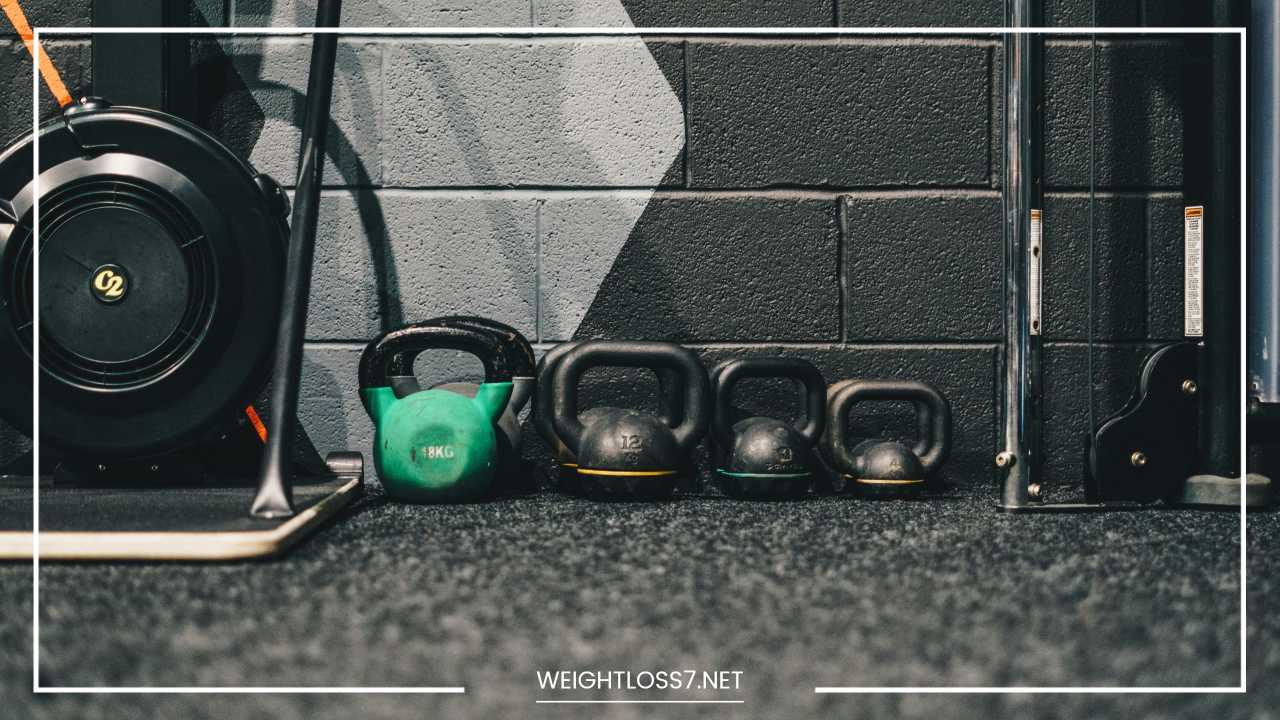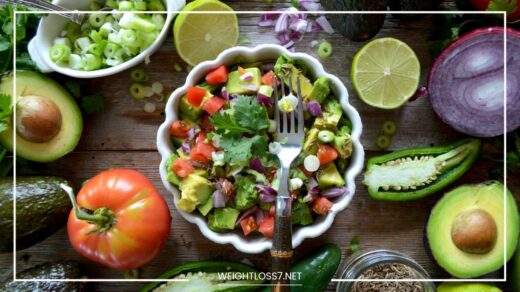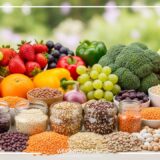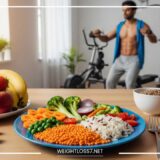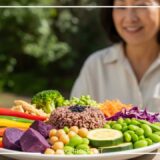How Do You Lose Weight
How Do You Lose Weight: Guide to Sustainable Weight Loss
Losing weight is a journey many embark upon, often filled with conflicting advice and short-lived solutions. In a world increasingly aware of the interconnectedness of personal health and planetary well-being, a vegetarian approach to weight loss offers a powerful, sustainable, and nutrient-rich pathway.
This isn’t just about cutting calories; it’s about embracing a vibrant diet brimming with plant-based goodness, fostering a healthy relationship with food, and integrating holistic practices that nourish both body and mind.
Far from being restrictive, a well-planned vegetarian diet can be incredibly diverse, satisfying, and uniquely effective for shedding excess weight and cultivating long-term wellness.
This article delves deep into the science and practice of losing weight through a comprehensive vegetarian lens, exploring not just what to eat, but also why it works, how to structure your meals, and the essential lifestyle factors that support lasting change.
Forget bland, repetitive diets; prepare to discover a colourful world of flavour and vitality that makes the weight loss journey enjoyable and sustainable.
Understanding the Fundamentals: Energy Balance and Beyond
At its core, weight loss hinges on a fundamental principle: creating a calorie deficit. This means consistently consuming fewer calories than your body expends through daily activities and metabolic processes.
Your Basal Metabolic Rate (BMR) is the number of calories your body burns at rest to maintain basic functions, while your Total Daily Energy Expenditure (TDEE) includes BMR plus the calories burned through physical activity. To lose weight, your calorie intake needs to be lower than your TDEE.
However, simply slashing calories can be counterproductive, leading to nutrient deficiencies, muscle loss, and metabolic slowdown.
The beauty of a vegetarian approach lies in its inherent advantages for achieving this deficit healthily and sustainably. Plant-based foods, particularly vegetables, fruits, and whole grains, are generally lower in calorie density compared to many animal products.
They are also packed with fiber, which plays a crucial role in weight management by promoting satiety, slowing digestion, and contributing fewer net calories.
Beyond the simple calorie equation, other factors significantly influence weight:
- Macronutrient Balance: The ratio of carbohydrates, protein, and fats you consume impacts satiety, energy levels, and muscle preservation.
- Micronutrients: Vitamins and minerals are essential for metabolic function. Deficiencies can hinder weight loss efforts.
- Hormonal Balance: Hormones like insulin, leptin (satiety hormone), ghrelin (hunger hormone), and cortisol (stress hormone) play critical roles in appetite, metabolism, and fat storage.
- Gut Health: The trillions of microorganisms in your gut influence nutrient absorption, metabolism, and even hormonal signals related to weight. A fiber-rich vegetarian diet nourishes beneficial gut bacteria.
- Lifestyle Factors: Sleep quality, stress levels, hydration, and physical activity all profoundly impact your body’s ability to lose weight.
A successful vegetarian weight loss strategy addresses all these interconnected elements, leveraging the unique strengths of a plant-based diet.
The Vegetarian Plate for Weight Loss: Building Blocks of Success
The cornerstone of a weight-loss focused vegetarian diet is building meals around nutrient-dense, low-calorie-density foods while ensuring adequate protein and healthy fats. Let’s break down the key components:
1. The Abundance of Vegetables:
Vegetables are your best friends on a weight loss journey. They are low in calories, high in volume (thanks to water and fiber), and bursting with vitamins, minerals, and antioxidants. Prioritize non-starchy vegetables:
- Leafy Greens: Spinach, kale, lettuce, collard greens, fenugreek leaves. Incredibly low in calories and packed with nutrients like iron and calcium.
- Cruciferous Vegetables: Broccoli, cauliflower, cabbage, Brussels sprouts. High in fiber and compounds that support detoxification.
- Other Non-Starchy Veggies: Cucumbers, tomatoes, peppers, zucchini, eggplant, mushrooms, onions, garlic, green beans, okra, bottle gourd, ridge gourd. Versatile and contribute volume without excessive calories.
How to Incorporate: Fill at least half of your plate with vegetables at every meal. Enjoy them raw in salads, steamed, roasted, stir-fried with minimal oil, or added to soups, stews, and curries. Avoid deep-frying, which adds significant calories.
2. The Sweetness of Fruits (in Moderation):
Fruits provide natural sweetness, fiber, vitamins, and antioxidants. While healthy, they contain natural sugars, so portion control is important, especially when actively trying to lose weight.
- Excellent Choices: Berries (strawberries, blueberries, raspberries), apples, pears, citrus fruits (oranges, grapefruits, lemons), melons (watermelon, cantaloupe). These are generally lower in sugar and higher in fiber.
- Portion Control: Limit higher-sugar fruits like bananas, mangoes, grapes, and dates to smaller servings or consume them strategically around workouts.
How to Incorporate: Enjoy fruits as a snack, add them to oatmeal or yogurt, or use them to naturally sweeten dishes.
3. Protein Powerhouses: Essential for Satiety and Muscle Preservation:
Adequate protein intake is crucial for weight loss. It helps you feel full longer, reduces cravings, and is essential for maintaining muscle mass, which is metabolically active and helps burn calories even at rest. Vegetarians have excellent plant-based protein sources:
- Lentils and Legumes: Various types of lentils (like mung beans, pigeon peas), chickpeas, kidney beans, black beans, split peas. Inexpensive, versatile, and packed with protein and fiber.
- Tofu and Tempeh: Made from soybeans, these are complete proteins. Tofu is versatile and takes on flavours well, while tempeh has a firmer texture and slightly nutty taste.
- Edamame: Young soybeans, great as a snack or added to stir-fries.
- Nuts and Seeds: Almonds, walnuts, chia seeds, flax seeds, pumpkin seeds, sunflower seeds. Excellent sources of protein, healthy fats, and fiber. Be mindful of portion size as they are calorie-dense.
- Paneer/Cottage Cheese (Dairy Option): A good source of protein and calcium if you include dairy in your vegetarian diet. Opt for low-fat versions and consume in moderation due to higher saturated fat content compared to purely plant-based proteins.
How to Incorporate: Include a protein source at every meal. Lentils and beans can form the base of curries, soups, and salads.
Tofu/tempeh can be stir-fried, baked, or grilled. Add nuts/seeds to salads, yogurt, or use them as a snack (measured portions).
4. Smart Carbohydrates: Fueling Your Body with Fiber:
Carbohydrates are your body’s primary energy source. The key for weight loss is choosing complex carbohydrates rich in fiber and nutrients, rather than refined carbohydrates that cause blood sugar spikes and energy crashes.
- Whole Grains: Oats (rolled or steel-cut), quinoa, brown rice, millet, barley, whole wheat flatbread or bread. These are digested slowly, providing sustained energy and promoting satiety.
- Limit Refined Grains: White rice, white bread, pasta made from refined flour, sugary cereals, pastries. These are stripped of fiber and nutrients and can contribute to weight gain.
How to Incorporate: Opt for whole grain versions of staples. Start your day with oats, use brown rice or quinoa as a base for meals, and choose whole wheat bread. Control portion sizes, as even healthy carbs have calories.
5. Healthy Fats: Essential for Absorption and Satiety:
Fats are crucial for hormone production, nutrient absorption (especially fat-soluble vitamins A, D, E, K), and add flavour and satiety to your meals. Focus on unsaturated fats and limit saturated and trans fats.
- Excellent Sources: Avocados, nuts, seeds, olive oil, coconut oil (use sparingly due to higher saturated fat), groundnut oil, mustard oil.
- Portion Control: Fats are calorie-dense (9 calories per gram vs. 4 for protein/carbs), so even healthy fats need to be consumed in controlled portions.
How to Incorporate: Use a moderate amount of healthy oil for cooking. Add slices of avocado to salads. Sprinkle nuts/seeds on meals (measured portions).
Putting It Together: Sample Vegetarian Meal Ideas for Weight Loss
Creating balanced, delicious vegetarian meals for weight loss is easier than you think. Here are some examples:
- Breakfast:
- Oatmeal cooked with water or unsweetened plant-based milk, topped with berries, a sprinkle of chia seeds, and a few chopped almonds.
- Whole wheat toast with avocado and sliced tomatoes.
- Mung bean savory pancake with chopped vegetables and a side of low-fat yogurt (if including dairy) or a plant-based alternative.
- Lunch:
- Large salad with mixed greens, cucumber, tomatoes, bell peppers, chickpeas or kidney beans, and a light vinaigrette.
- Brown rice or quinoa bowl with steamed vegetables and pan-fried tofu or tempeh.
- Lentil soup or vegetable soup with a small piece of whole wheat flatbread.
- Dinner:
- Mixed vegetable curry (cooked with minimal oil) with brown rice or quinoa.
- Baked or pan-fried tofu/tempeh with a side of roasted broccoli and cauliflower.
- Vegetable and bean chili.
- Snacks (Portion Controlled):
- A piece of fruit (e.g., an apple or orange).
- A small handful of nuts (about 15-20 almonds or walnuts).
- Vegetable sticks (carrots, cucumber, peppers) with hummus (made from chickpeas).
- A small bowl of low-fat yogurt (if including dairy) or plant-based yogurt.
Practical Strategies for Success: Beyond the Plate
While diet is paramount, sustainable weight loss requires a holistic approach that encompasses lifestyle changes.
1. Hydration is Key:
Drinking enough water is often overlooked but crucial for weight loss. Water helps with metabolism, aids digestion, helps you feel full, and can sometimes curb cravings mistaken for hunger.
Aim for at least 8-10 glasses of water per day, and more if you’re exercising or in a hot climate. Herbal teas can also contribute to your fluid intake.
2. Movement is Medicine: Integrating Physical Activity:
Exercise is essential for burning calories, building muscle mass (which boosts metabolism), improving cardiovascular health, reducing stress, and enhancing overall well-being. Incorporate different types of activity:
- Cardio (Aerobic Exercise): Activities like brisk walking, running, cycling, swimming, or dancing burn calories and improve heart health. Aim for at least 150 minutes of moderate-intensity or 75 minutes of vigorous-intensity1 cardio per week.
- Strength Training: Building muscle is vital for boosting your metabolism. Incorporate bodyweight exercises (squats, push-ups, lunges), resistance bands, or weights 2-3 times per week. You don’t need a gym; many effective exercises can be done at home.
- Flexibility and Mobility: Yoga or stretching helps improve flexibility, reduce muscle soreness, and can be excellent for stress reduction.
Find activities you enjoy to make exercise a sustainable part of your routine. Consistency is more important than intensity when you’re starting.
3. The Power of Sleep:
Chronic sleep deprivation disrupts hormones that regulate appetite (ghrelin and leptin) and increases cortisol, leading to increased hunger (especially for unhealthy foods) and a tendency to store fat.
Aim for 7-9 hours of quality sleep per night. Establish a regular sleep schedule and create a relaxing bedtime routine.3
4. Taming Stress:
Chronic stress elevates cortisol levels, which can increase appetite and promote fat storage, particularly around the abdomen. Finding healthy ways to manage stress is vital for weight loss.
- Mindfulness and Meditation: Even a few minutes a day can make a difference.
- Yoga: Combines physical activity with mindfulness and breathing exercises.
- Deep Breathing Exercises: Simple techniques to calm the nervous system.
- Spending Time in Nature: Walking or simply being outdoors can be incredibly stress-reducing.
- Hobbies: Engage in activities you enjoy to unwind.
- Connecting with Loved Ones: Social support is crucial.
5. Cultivating a Weight-Loss Mindset:
Weight loss is as much a mental game as a physical one. Foster a positive and patient mindset.
- Set Realistic Goals: Aim for gradual, sustainable weight loss (typically 0.5-1 kg per week).
- Focus on Non-Scale Victories: Celebrate improvements in energy levels, fitness, clothing fit, and overall well-being, not just the number on the scale.
- Be Consistent, Not Perfect: Don’t let minor slip-ups derail your efforts. Get back on track at the next meal.
- Practice Self-Compassion: Be kind to yourself throughout the process.
- Identify Your “Why”: Remind yourself why you want to lose weight to stay motivated.
Navigating Challenges on a Vegetarian Path
Even with a solid plan, challenges can arise.
- Cravings: Cravings often stem from habit, emotions, or actual hunger. Ensure your meals are balanced and satisfying. Keep healthy vegetarian snacks on hand (fruit, nuts, vegetable sticks). Practice mindful eating – sometimes a craving passes if you wait a few minutes.
- Plateaus: Weight loss isn’t always linear. Plateaus are normal. When they occur, re-evaluate your calorie intake and exercise routine. Sometimes increasing exercise intensity or slightly adjusting your macro balance can help. Ensure you haven’t become complacent with portion sizes.
- Social Situations: Eating out or attending social gatherings can be tricky. Look at menus in advance and identify vegetarian options. Don’t be afraid to ask for modifications (e.g., steamed vegetables instead of fried). Focus on vegetables and protein, and be mindful of sauces and dressings. Offer to bring a healthy vegetarian dish to potlucks.
Sustainability: Making it a Lifestyle
True weight loss success is about creating lasting habits, not following a temporary diet. A vegetarian approach lends itself beautifully to a sustainable lifestyle because it encourages a focus on whole, unprocessed foods, which are inherently nourishing.
- Find Joy in Vegetarian Cooking: Explore new recipes, spices, and cooking methods. Discover the incredible variety of flavours and textures that plant-based foods offer.
- Listen to Your Body: Pay attention to hunger and fullness cues. Learn which foods make you feel best.
- Build Sustainable Habits: Instead of drastic changes, focus on implementing small, consistent habits over time.
- Allow for Flexibility: Occasional treats or deviations are normal and healthy. It’s about overall patterns, not perfection.
The Importance of Professional Guidance
While this article provides a comprehensive guide, individual needs vary. Consulting with healthcare professionals is highly recommended:
- Your Doctor: To rule out any underlying medical conditions that might affect weight and to discuss the safety of starting a new diet and exercise plan.
- A Registered Dietitian or Nutritionist: Especially one with experience in vegetarian or plant-based diets, can help you create a personalized meal plan, ensure you’re meeting all your nutrient needs (like Vitamin B12, Iron, Zinc, Calcium, and Omega-3s, which require careful planning on a purely plant-based diet), and provide ongoing support and guidance tailored to your goals and lifestyle.
Final Thoughts: Embracing the Vegetarian Advantage
Losing weight is a transformative process that extends far beyond the numbers on a scale. It’s about building a healthier, more vibrant you.
A well-executed vegetarian approach offers a powerful, sustainable, and uniquely nourishing path to achieving your weight loss goals.
By focusing on nutrient-dense vegetables, fruits, whole grains, and powerful plant-based proteins like lentils, beans, tofu, and tempeh, you can create a calorie deficit while flooding your body with essential vitamins, minerals, and fiber.
Coupled with regular physical activity, adequate sleep, effective stress management, and a positive mindset, you build a foundation for lasting health and well-being.
Embrace the abundance and flavour of the vegetarian world. This journey isn’t about deprivation; it’s about discovering a flourishing way of eating and living that nourishes your body, respects the planet, and empowers you to achieve sustainable weight loss and a healthier, happier life. Start today, one delicious, plant-powered meal at a time.

